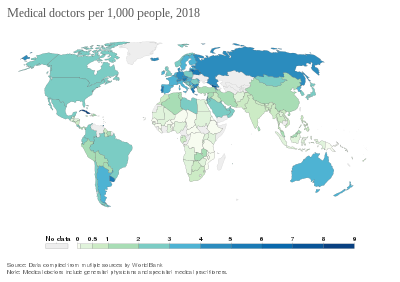
Health human resources (HHR) – also known as human resources for health (HRH) or health workforce – is defined as "all people engaged in actions whose primary intent is to enhance positive health outcomes", according to World Health Organization's World Health Report 2006.[2] Human resources for health are identified as one of the six core building blocks of a health system.[3] They include physicians, nursing professionals, pharmacists, midwives, dentists, allied health professions, community health workers, and other social service and health care providers.
Health human resources are further composed of health management and support personnel: those who do not provide direct patient care but add important value to enhance health system efficiency, effectiveness and equity. They include health services managers, medical records and health information technicians, health economists, health supply chain managers, medical secretaries, facility maintenance workers, and others.
The field of HHR deals with issues such as workforce planning and policy evaluation, recruitment and retention, training and development of skilled personnel, performance management, health workforce information systems, and research on health workforce strengthening. Raising awareness of the critical role of human resources in the health care sector - particularly as exacerbated by health labour shortages stemming from the Covid-19 pandemic - has placed the health workforce as one of the highest priorities of the global health agenda.[4][5]
- ^ "Medical doctors per 1,000 people". Our World in Data. Retrieved 5 March 2020.
- ^ "The world health report 2006: working together for health". World Health Organization. Geneva. 2006. Archived from the original on December 2, 2006.
- ^ "Health Systems Topics". World Health Organization. Geneva. Archived from the original on January 29, 2007.
- ^ Grépin, Karen A; Savedoff, William D (November 2009). "10 Best Resources on ... health workers in developing countries". Health Policy and Planning. 24 (6): 479–482. doi:10.1093/heapol/czp038. PMID 19726562.
- ^ Gupta, Neeru; Balcom, Sarah; Gulliver, Adrienne; Witherspoon, Richelle (March 2021). "Health workforce surge capacity during the COVID-19 pandemic and other global respiratory disease outbreaks: A systematic review of health system requirements and responses". International Journal of Health Planning and Management. 24 (36): 26–41. doi:10.1002/hpm.3137. PMC 8013474.